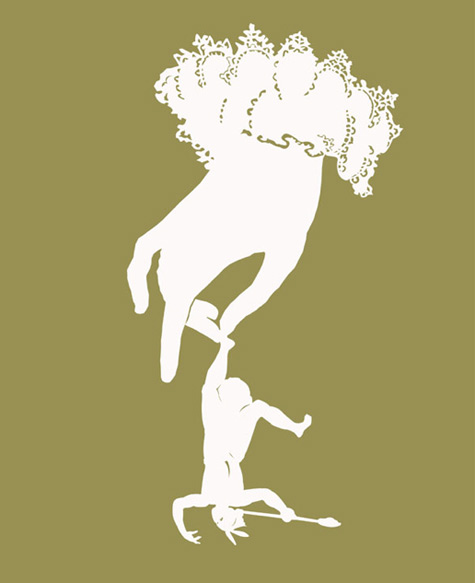
Lauren Adams, Pearlclutcher (detail) from the Lost Colony Project (2009-11). Digital vector drawing. Courtesy of the artist.
The Sam Fox School of Design & Visual Arts has announced the recipients of its 2011 Faculty Creative Activity Research Grants.
Four art and architecture faculty members will each receive between $1,000 and $8,000 to support a variety of projects. These range from research about the Elizabethan “Lost Colony” of North Carolina and a monograph on Dutch architect Aldo van Eyck to a mobile art studio traveling the Gulf Coast and new methods of architectural fabrication in Jakarta, Indonesia.
“The Faculty Creative Activity Research Grants were established in 2007 and designed to support the professional and creative activities that are distinctive to architecture, design and art,” says Carmon Colangelo, dean of the Sam Fox School and E. Desmond Lee Professor of Collaboration in the Arts. “Supporting faculty research is a top priority, knowing that the creative activity of our faculty has played a key role in distinguishing us as a school.”
“The diversity and scope of past projects, both ideologically and geographically, has been impressive, and the four proposals being funded this year are no exception,” Colangelo says.
Recipients were chosen by a jury of tenured and tenure-track faculty, including several past grant awardees.
Recipients for 2011 are:
Lauren Adams, assistant professor of art.
The grant supports research and travel relating to her Lost Colony Project, a trans-Atlantic art installation comprising paintings, drawings and collages investigating the power dynamics of Elizabethan colonialism. The series centers on the story of — and mythmaking around — the so-called Lost Colony, a settlement on Roanoke Island in present-day North Carolina, that vanished without explanation between 1587-90. The project is particularly inspired by the work of colonist John White, whose drawings and watercolors of native Algonquins and Secotans are among the most informative surviving illustrations of pre-colonial Native American culture.
Joan Hall, the Kenneth E. Hudson Professor of Art.
The grant supports the creation of The Gulf Project, a large-scale installation exploring the relationship between human beings and the sea. Hall, an internationally known artist as well as an experienced sailor, has frequently addressed nautical themes in her work. For this project, she is outfitting an RV as a mobile art studio and traveling along the Gulf of Mexico, from Port Arthur, Texas, to New Orleans, documenting the aftereffects of the infamous Deepwater Horizon oil spill.
Robert McCarter, the Ruth and Norman Moore Professor of Architecture.
The grant supports publication of the first comprehensive monograph on Aldo van Eyck (1918-99), arguably the most influential of the second generation of Modern architects. The book particularly focuses on two aspects of van Eyck’s career: his built and unbuilt works, which, though relatively few in number, helped form a new paradigm for 20th-century Modern architecture; and his writings and lectures, which critiqued mainstream mid-century Modernism while exploring the importance of architecture to the everyday lives of people around the world.
Christine Yogiaman, assistant professor of architecture.
The grant facilitates research and fabrication of three full-scale architectural assembly prototypes relating to a pair of projects now in development in Jakarta, Indonesia: Weft House, a single-family residence, and Cideng Office Structure, a seven-story flagship building for a steel manufacturing company. More specifically, the grant supports development of new systems of assembly designed to better integrate the latest advances in digital design and fabrication with the hands-on, material sensitivity of traditional construction tradespeople.
For more information about the Sam Fox School Faculty Creative Activity Research Grants, visit samfoxschool.wustl.edu.